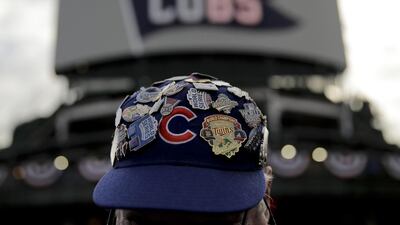I am not a fan. I have many interests, even a few passions, but I don’t follow any particular thing to the exclusion of all others. Arsenal, Manchester City, Chelsea? To me it’s all just men chasing a ball across an exhaustingly large pitch. My household roots for Arsenal, so I suppose I do as well, but not with much conviction, which the household regards as significant moral failure.
My lack of fandom is why my sister was puzzled when she saw my Facebook post cheering about the Chicago Cubs, who made it to the World Series this year for the first time since 1945. The last time the Cubs won the series was more than a century ago: 1908. This morning they may well be world champions again.
“I didn’t know you liked baseball,” my sister wrote, and she’s right: I don’t like “baseball". I like “the Cubs”, although not as much as does a friend of mine here, who has been waking up at 3am to watch the games in real time.
I grew up in a small town outside Chicago, and when I was a girl, we had a tiny black-and-white television, which was then the height of innovation because it was portable. My father watched the Cubs on that TV, and depending on where in the house he’d perched the TV, the excited voices of the baseball commentators were louder or softer; their voices, mingled with the shouts of the crowd and the thwack of the bat, weave through the summer memories of my childhood.
As I reread that sentence, I realise I’ve done precisely one of the things that I dislike about “baseball”, which is the fact that writing about baseball is all too often suffused with nostalgia, as if it’s impossible to write about the present moment without invoking the past. But maybe that’s one of the reasons that people follow sports: the games become vehicles for memory, both collective and individual.
Baseball is “the American game”, people say, which makes the idea of the “World Series” rather ironic. The name illustrates the way the United States has traditionally viewed itself: baseball construes “the world” as something that involves only American teams (although team rosters are starting to feature a more international assemblage of players).
Also on display this year is another manifestation of US closed-mindedness: the logo of the Cubs’ opponents, the Cleveland Indians, features a cartoonishly racist image of a Native American, and the owner of the team says that “Chief Wahoo” can’t be retired because it is an integral part of the team’s brand. The logo seems particularly egregious in light of the protests going on in Standing Rock, North Dakota, where the government has proposed to build an oil pipeline across sacred tribal ground.
Those who love “baseball” say I’m missing the point, that the game’s stately rhythms, punctuated by explosions of speed and athleticism, offer an antidote to the ugliness of the world. Maybe that’s another sport truism: we watch the staged mayhem of sports as a respite from the mayhem in our lives. Wouldn’t it be nice, for example, if things like the Standing Rock pipeline or the Trump presidential campaign could be halted by someone calling “foul”?
As I write this piece, I’m thinking about a dear friend in the States who has loved the Cubs for the entirety of her 80-plus years; she feels the sting of each loss, the elation of every win.
Like all true Cubs fans, she takes no victory for granted, but how will she, or my 3am baseball-watching friend, or my father handle either the disappointment or the victory when the final game of the World Series has concluded?
So I cheer for “my” team, spurred on by solidarity and nostalgia, hoping that this year, they found a way to win. But if they have lost, I’ve spent enough time with baseball fans to know what to say: “There’s always next year.”
Deborah Lindsay Williams is a professor of literature at NYU Abu Dhabi

